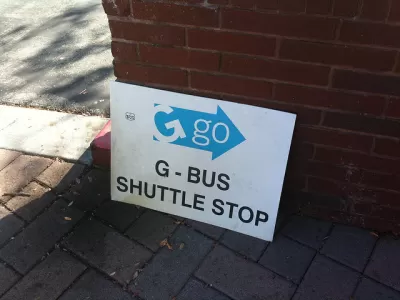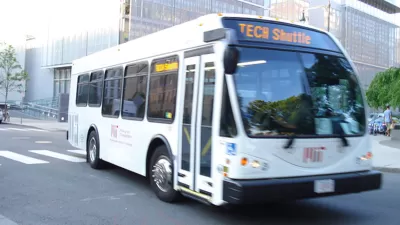Public pressure led the city of San Francisco to cut and relocate tech shuttle stops. Now the cities at the other end of the commute might be dealing with the consequences of those decisions.

According to an article by Wendy Lee, more employees of Facebook are driving alone to the company's headquarters in Menlo Park since San Francisco cut the number of shuttle bus stops allowed in the Mission District and other neighborhoods around the city.
According to Lee, the SFMTA "has closed 33 shuttle stops, while adding others" since the launch of a pilot program in August 2014. "With an official program in place as of April," adds Lee, "the total number of stops has gone from 125 to 110." That official program "allows tech buses to share Muni stops for at least a year but also requires buses longer than 35 feet to stick to major thoroughfares."
As a result, fewer Facebook employees are taking the shuttle and choosing to drive instead—according to a recent Facebook report to the city of Menlo Park. According to that report, "on May 9, trips entering Facebook’s complex at One Hacker Way increased by about 16 percent to 12,400 compared with May 8 of last year." The MTA is also undertaking a study of shuttle ridership, and considering further refining the shuttle system to operate on a hub model—which would move stops to locations like the Transbay Terminal instead of the residential neighborhoods.
FULL STORY: More tech workers driving solo after SF cuts shuttle stops

Planetizen Federal Action Tracker
A weekly monitor of how Trump’s orders and actions are impacting planners and planning in America.

San Francisco's School District Spent $105M To Build Affordable Housing for Teachers — And That's Just the Beginning
SFUSD joins a growing list of school districts using their land holdings to address housing affordability challenges faced by their own employees.

The Tiny, Adorable $7,000 Car Turning Japan Onto EVs
The single seat Mibot charges from a regular plug as quickly as an iPad, and is about half the price of an average EV.

As Trump Phases Out FEMA, Is It Time to Flee the Floodplains?
With less federal funding available for disaster relief efforts, the need to relocate at-risk communities is more urgent than ever.

With Protected Lanes, 460% More People Commute by Bike
For those needing more ammo, more data proving what we already knew is here.

In More Metros Than You’d Think, Suburbs are Now More Expensive Than the City
If you're moving to the burbs to save on square footage, data shows you should think again.
Urban Design for Planners 1: Software Tools
This six-course series explores essential urban design concepts using open source software and equips planners with the tools they need to participate fully in the urban design process.
Planning for Universal Design
Learn the tools for implementing Universal Design in planning regulations.
Smith Gee Studio
City of Charlotte
City of Camden Redevelopment Agency
City of Astoria
Transportation Research & Education Center (TREC) at Portland State University
US High Speed Rail Association
City of Camden Redevelopment Agency
Municipality of Princeton (NJ)




























